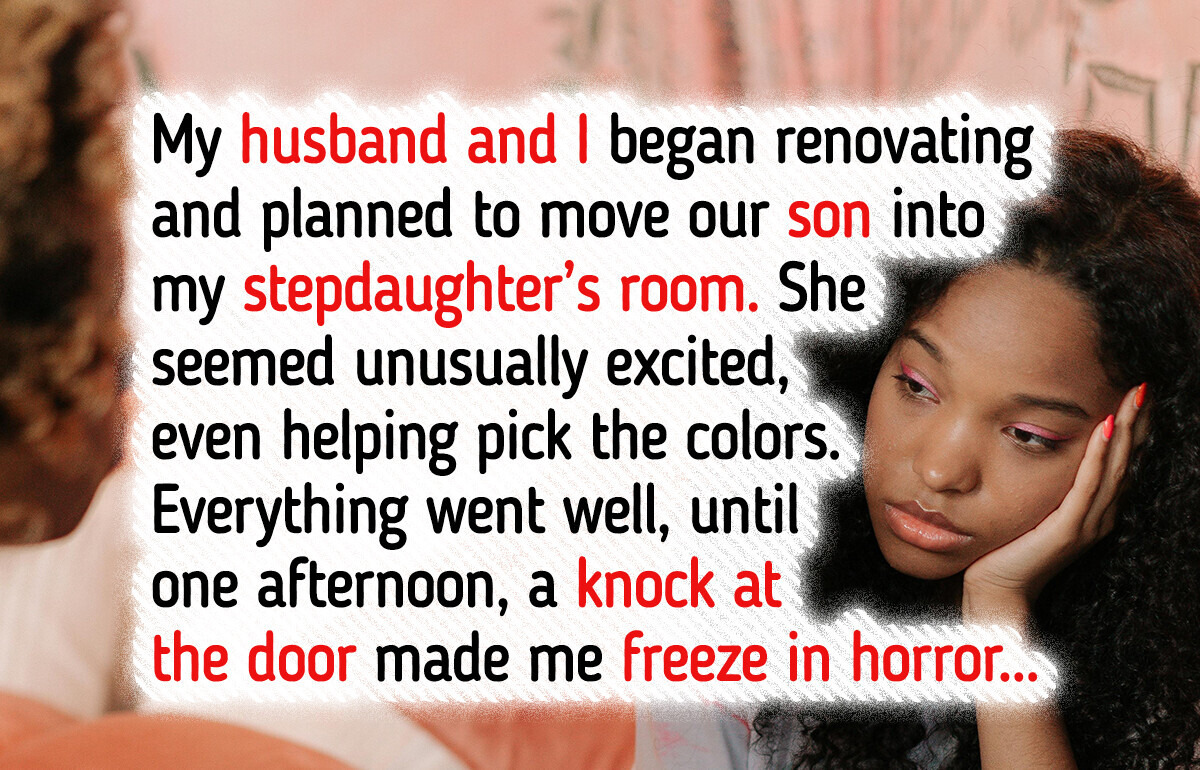So you treated her like something disposable and thought she'd be ok with it!?? Wow you are a terrible stepmonster!! Good for your stepdaughter!! How could you kick her out of her room?? That poor girl!! Ugh I hate step parents like you!!
I Gave My Stepdaughter’s Room to My Son—She Secretly Got Back at Us

Blended families bring a beautiful mix of love and new connections, though sometimes they come with challenges—especially when it comes to sharing space and building strong bonds between step-siblings.

In one family, a plan to renovate the house and move their son into the wife’s stepdaughter’s room began with excitement, but things soon changed as she shares:
“My husband and I decided it was time to renovate our house, and we planned to move our son into my stepdaughter’s room. She seemed excited about the change—even eager to help pick out the colors.
Everything was going perfectly...until one afternoon, a knock came at the door.
I opened it and froze in horror. There she stood—my stepdaughter, arms crossed—with our neighbor and a police officer right behind her.
She had secretly reached out for help, claiming she was being forced out of her room.
I was stunned. Just days ago, she had been so enthusiastic. Now, it felt like a painful betrayal wrapped in teenage rebellion and whispered secrets.
Had I missed the signs? Was this her only way to make herself heard?”

We truly understand that you may be feeling shocked, confused, or even hurt right now. It’s natural to feel this way when someone you care about reacts so unexpectedly.
But try not to be too hard on yourself. Sometimes, teenagers—especially stepchildren— may struggle to express their feelings openly and may act out when they feel vulnerable or uncertain.
At the same time, we understand how challenging it can be to balance everyone’s needs and create a harmonious home. You want your son to feel comfortable, your stepdaughter to feel respected, and your family to feel united. It’s a lot to handle, and it’s okay to feel overwhelmed.
To help you turn tension into teamwork, we’d love to share 5 tips with you.
1. Acknowledge and validate your stepdaughter’s feelings.
Before trying to fix the situation, take time to genuinely listen and acknowledge how she feels about losing her room. Even if the plan seemed fair to you, her feelings of loss or fear are real. Validating her emotions helps reduce resistance and opens the door for cooperation.
2. Explore creative room-sharing solutions together.
Instead of imposing the room change, involve both children in brainstorming how the space can work for them—whether that means rearranging furniture, adding personal touches, or even alternating rooms. This shared decision-making shows respect and eases feelings of being forced out.
3. Reassure her role and place in the family.
Sometimes, losing a personal space feels like losing a part of one’s identity or family status. Regularly reassure your stepdaughter that her place in the family is secure and valued—beyond any room or physical space. Emotional security helps reduce fear and resentment.
4. Set clear, fair boundaries about shared spaces.
Agree on ground rules that respect everyone’s privacy and belongings. When children understand what’s expected and see that their space is protected, they’re less likely to feel threatened or act out.
5. Keep communication open and watch for signs.
Let her know she can always come to you with concerns—and stay alert for subtle signs of distress. Early communication prevents problems from escalating to secret calls for help. If needed, don’t hesitate to bring in a counselor to help navigate the emotions involved.
If you’re interested in exploring more real-life stories about the complexities of step-parenting—some that went way off track—check out our next article: 14 Step-Parents Who Took Things Way Too Far.
Comments
So you choose to kick your stepdaughter out of her room and give it to your son and you wonder why she confides in a neighbour about it and if you did something wrong and missed something.
You decided that your stepdaughter don't deserve her safe place and her place to get some privacy. To you she is just last week's trash and not a child.
You are a very horrible person and I really hope you end up on your own as you clearly don't care about anyone other than yourself and your precious son. Classic evil stepmother
Related Reads
10 Real Stories of Kindness That Pour Honey on People’s Souls

My Husband Sneaks Out Every Night When He Thinks I’m Sleeping

Donatella Versace Goes Viral at the 2025 Met Gala—All Eyes on One Detail

11 Stories That Prove First Love May Be Short, but Leaves a Lasting Mark Forever

My Family Excluded My Girlfriend From Christmas Because We’re Not Married

12 Moments That Show Quiet Kindness Is Much Stronger Than the World Thinks

I Refused to Pay for Our Valentine’s Dinner—Then I Learned the Heartbreaking Truth

17 Moments That Remind Us Kindness Is a Choice, Not a Mood

15 Stories That Inspire Us to Choose Kindness, Even If the World Gets Ugly

I Lost My Job to “Restructuring” and My Severance Disappeared, Then I Turned the Tables

HR Told Me to Be Grateful for Pay That No Longer Covers Rent — Then Reality Hit Harder

I Refuse to Be My Brother’s ATM Anymore—The Revenge He Planned Was Sick





